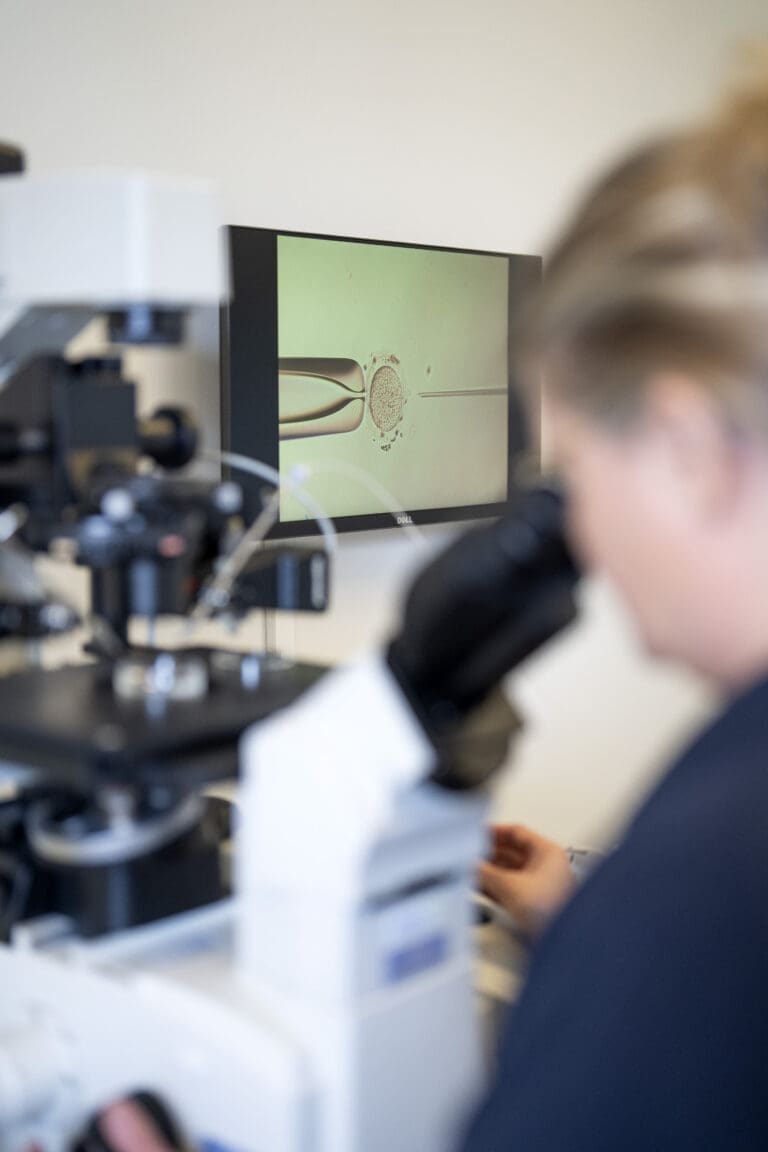
If no sperm cells are found in the semen sample (azoospermia), either at the local hospital or here at the clinic, this may be due to a lack of sperm formation in the testicle or a lack of sperm cells in the seminal fluid.
A lack of sperm in the testicle may be due to a congenital defect in the testicular tissue, while a lack of sperm in the seminal fluid may be due to a blockage of the vas deferens, either intentionally (sterilisation) or unintentionally, for example caused by a chlamydia infection.
Testis biopsy/TESA
A small sample from the testicle (testis biopsy) can be taken to check for living sperm cells in the testicular tissue. If sperm cells are found in this testicular biopsy, the same procedure can be performed again later in connection with the woman’s IVF treatment. Sometimes it is also possible to freeze the biopsy for later use.
The procedure itself
The procedure is typically uncomplicated and is performed here at the clinic. It takes approximately ½ hour.
A local anaesthetic is injected into the testicle and after about 15 minutes. the sample is removed from the testicle using a thin biopsy needle. Most men experience some discomfort during the procedure.
In the laboratory at the clinic, the sample is analysed for the presence of sperm cells.
You will receive the results of the test immediately after the procedure.
No sperm cells in the testisbiosi
If no sperm cells are found in a testis biopsy, donor insemination can be performed. Read more about treatment with donor sperm under the menu item Treatments.
After the procedure
The next few days following the procedure, you might feel a light pain in the scrotum and groin. So we advise you to rest for a few day. You can go to work, but refrain from hard physical labour.
Painkillers can be taken if needed.

TESA in connection with IVF treatment
TESA/Testicular sperm retrieval – is performed on the same day as the woman’s egg retrieval.
TESA is performed exactly as described above. Only a few sperm cells are retrieved during TESA, as it is only necessary to retrieve the same number of sperm cells as there are eggs. Due to the small number of sperm cells, the woman’s eggs are always fertilised using microinsemination/ICSI (Intracellular Sperm Injection). ICSI is when the sperm cell is inserted directly into the egg, using a thin glass needle.
No sperm cells on the day of treatment
In very rare cases, no live sperm cells may be found in connection with the above-mentioned procedures, even if previous tests have shown the presence of sperm cells. You should therefore decide, before the egg retrieval, whether the retrieved eggs should be fertilised with donor sperm, be destroyed or be frozen as unfertilised eggs.

Summer holiday 2025
The clinic is closed
for the summer holidays
from 12th – 27th of July
 Phone. +45 76 24 50 20
Phone. +45 76 24 50 20  info@ivf-syd.dk
info@ivf-syd.dk 